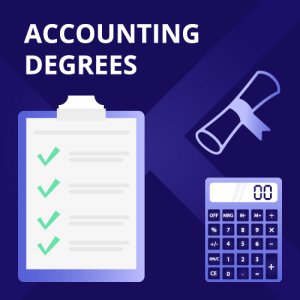What Kind of Accreditation Should My Degree Program Have?
The first and important thing to consider is accreditation of the educational institution, school or faculty.
We think “time is money”, and nobody wants to waste their funds and time on a useless and unpromising degree.
If you want to make sure that your future employer will treat you like a valuable employee, then you must choose institutions with proper accreditation.
What is accreditation?
So-called educational accreditation is a kind of license which shows that educational institution sticks to the standards and qualities approved by the Department of Education.
Only accredited universities and colleges are entitled to get financial aid from the state budgets.
Accreditation also means that the institution continues to develop and enhance its professionalism within its field of specialization.
While you will be seeking for the right institution, you will discover two kinds of accreditation: institutional and program accreditation.
One of them, institutional accreditation means wide accreditation of the institution.
At the same time, program accreditation means that approval from the Educational State Department was given only to the specific discipline or degree program.
Regional Accrediting Agencies
The educational accrediting agencies are conditionally divided into two groups.
They are national accrediting agencies and regional ones.
As a rule, the approval of accrediting agencies of the region gives more trust in the credibility of the institution.
When you are searching for the accrediting university, college or school, you should look for “stamp of approval” from the lists of the regional accrediting agencies.
To name but a few:
- Northwest Commission on Colleges and Universities
- Southern Association of Colleges and Schools Commission on Colleges
- Western Association of Schools and Colleges
- The Higher Learning Commission
- New England Association of Schools and Colleges
- Middle States Commission on Higher Education
Program Accreditation
Program accreditation is one of particular importance while getting an accounting degree.
Such importance is caused by the demands of employers to employee program of expertise, which should be approved by national program accreditation.
You should know that one of the most reputable stamps of approval is the accounting accreditation of the Association to Advance Collegiate Schools of Business’s (AACSB).
At the moment the Association approved about 182 qualified accounting schools.
If you want to know details about the accreditation status of your potential institution, do not hesitate to contact your school administration or visit the website for any of the accreditation agencies which we have mentioned above.
These websites provide the reader with a searchable database of accredited institutions and accredited degree programs.
Moreover, you can visit the database on the Department of Education’s website where you will also find the list of recognized accounting accreditors.
We guess you have got the idea of accreditation. The next step is learning about the degree options.
What Kinds of Accounting Degrees Are There?
Associate Degree in Accounting
The first kind of accounting degree is an Associate Degree in Accounting.
Typically the program of the associate degree is introductory and takes two years to complete.
What does this program include?
You will get acquainted with the basics and principles of the accounting, as well as obtain accounting skills to start work in the entry-level of the area.
However, after you end the associate degree program you will not earn much money working as a bookkeeper, accounting clerk or take some other positions.
So, you should go further to become the second kind of degree – bachelor’s degree.
It is called Certified Public Accountant (CPA) and take a four-year program in accounting to continue to study.
On the basis of the associate degree, you can earn the Bachelor’s one, not only in accounting but also in the related fields like finance or business.
That’s why associate degree has a great value for you and will help to build a career in the future, using profound knowledge and skills.
There is a list of courses you will have within your associate program:
- Accounting Theory and Applications
- Auditing
- Business Ethics
- Business Mathematics
- Introduction to Business Law
- Microeconomics, to name but six.
How an AAS, an AA, and an AS in accounting differs?
Do you plan to get a job immediately after two-year studying?
Then the Associate of Applied Science in Accounting (ASS) will be your best choice.
ASS is recommended for students who don’t plan to continue their study and take the bachelor’s degree program.
The Associate of Arts (AA), as well as the Associate of Science (AS) in accounting degrees, are essential if you plan to be the professional accountant ultimately after all.
For you to distinguish, the AS is more math- and science-orientated.
While the course of AA study typically provides a liberal arts education together with accounting studies.
Bachelor of Accounting
The first substantial step to becoming the CPA is getting of the bachelor’s degree in accounting.
After completing the bachelor’s degree you will have a chance to take the American Institute of Certified Public Accountants exam.
Bachelor’s degree in the U.S. includes at least 150 credit hours, which you have to go through before passing the exam.
So, the bachelor’s degree takes four years to study and contains knowledge in such areas as planning, financial technology, analysis and audit, and executive decision making.
The program also includes practical aspects of the profession of the accountant.
For example, students are able to get skills and experience from professionals, who are working in the area of expertise.
We have no doubt that this degree will be a huge step to becoming an accountant, or even an auditor or a financial analyst, or simply will help to get a well-paying job.
However, employers want their employees to have previous working experience, so that, in most cases, you will need to find post-graduate work after you get the bachelor’s degree.
What courses will you take during the Bachelor’s degree program?
- Accounting Information Systems
- Payroll Accounting
- Tax Law
- Financial Reporting and Auditing
- Applied Business Statistics
- Principles of Marketing
- Investment Portfolio Management
- Entrepreneurial Finance
What’s the main difference between a BS, a BAC, and a BBA in Accounting?
If you desire to focus your study on accounting in the business context, then you must take a Bachelor of Science (BS) in accounting degree.
For those students who want to move on and get a master`s degree, a Bachelor of Accounting (BAC) will provide with the profound understanding of accounting themes.
Bachelor of Business Administration (BBA) should consider those people who are ready to study both accounting topics and general business topics equally.
Master of Accounting
Planning to become a certified accountant?
Then take this path without doubts.
Now, 40 states of the USA require 150 credit hours for CPA certification.
That’s an additional year of study after your bachelor’s degree, that means that a master’s degree is very important.
Let’s say, you have a few options in this case.
All the large companies seek employees with either a Master of Business Administration with an emphasis in accounting (MBA) or Master of Science in Accounting (MS).
Both these degrees will help you to become qualified for an executive-level position and will also allow you to sit for the CPA certification exam.
After you get the master’s degree you become a great candidate for a position in the highly-competitive field.
During the course, you will study such subjects as regulatory compliance, forensic accounting, and corporate auditing, as well as areas of professional expertise.
To conclude, the master’s degree in accounting qualifies you for a broad range of carrier opportunities and bring you to the new horizons.
You will take these courses within the Master’s degree program:
- Mergers and Acquisitions
- Corporate Tax Decisions and Strategies
- Issues in Regulatory Enforcement
- Business Law and Ethics
- Accounting in the Global Business Environment
- Financial Modeling
- Quantitative Analysis and Business Decisions
- Advanced Public Sector Accounting
What’s the Difference between an MS, a MAcc, an MPAc, and an MBA in Accounting?
One of the distinguishing features is that the Master of Science in Accounting (MS) and the Master of Accountancy (MAcc) are particularly reserved for those people who have obtained an undergraduate degree in accounting or any other related field.
Thus, the MS can offer a specialized focus on certain math-intensive courses.
But other differences between these programs are slightly visible.
Each of these programs will normally require from 30 to 36 credit hours or one year of study.
On the other hand, undergraduates from a wide range of disciplines can get access to the Master of Business Administration in Accounting (MBA) and the Master of Professional Accounting (MPAc) programs.
So, the MBA focuses on general business issues together with accounting, whereas the MPAc offers a concentration mostly on accounting issues.
The duration of these programs is from 45 to 60 credit hours or two years of work.
Ph.D. in Accounting
Depending on the programs, you can get your Ph.D. in accounting either after completing your master’s degree or you may be able to skip right after you got a bachelor’s degree.
As a rule, applicants will also need to provide GMAT scores.
PhD program is an extremely rigorous and accurate program, which requires good knowledge in maths and extensive writing,
During the program, you’ll learn statistical analysis, advanced research methods, and general business principles.
After the theory, you’ll be required to produce original research in the area of your expertise.
If research and academics are your cups of tea, then this degree is an ideal career path for your specialization.
After getting a Ph.D. you can easily continue to become a professor of accountancy.
But there is also a prospect for people who get Ph.D. to be employed for decision-making and high-paying role in a big company.
Ph.D. could be recommended on the position of a senior financial advisor in a big company or a thought leader in a middle-size organization.
A person with a Ph.D. degree can also become a public policy analyst who will have the competence to influence legislative issues and outcomes.
What Kind of Licensing or Certification Do You Need?
Before all, to become a Certified Public Accountant, you need to pass the licensing examination, which is held by the American Institute of Certified Public Accountants (AICPA).
As we mentioned above, you are required to complete 150 credit hours of study to get access to the exam.
This means, in turn, that you’ll probably get an advanced degree like an MS or an MBA.
Most of the USA states require this license so that you are able to find employment as an accountant.
Even if some jobs or federal states don’t require such certification, but if you become a CPA, this will significantly improve the interest of employers to your, as well as your future career potential.
In any case, you can also use your accounting education in a related field, separate from accounting.
For instance, if you are going to manage payroll duties for a large firm, you may be required to become a Certified Payroll Professional (CPP).
CPP is a status given by the American Payroll Association.
For example, to practice as an actuary, you’ll need to get a license.
The license you can obtain both from the Casualty Actuarial Society (CAS) or the Society of Actuaries (SOA).
Both, CAS and SOA require passing of certification courses and exams.
You can pursue your certification together with your regular coursework in one part of the cases above.
In other cases, for example, CPA, you can include your certification and licensing work into your general coursework on accounting.
So, you will graduate with certification already in your hand.
Popular Degree Programs
What Can You Do With This Degree?
Frankly speaking, accounting is extremely actual these days.
The demand has grown and will continue to grow at 11% according to the Bureau of Labor Statistics (BLS) in the ten years between 2014 and 2024.
The accounting area is foreseen to add 142,400 new working places in that period of time.
Either big companies or small businesses are willing to employ accounting professionals that are orientated to solve complex and global issues, and good at what they do with assets.
Here you can observe a wide range of careers you can join with your accounting degree:
- Loan Officers
- Purchasing Managers, Buyers, and Purchasing Agents
- Statisticians
- Logisticians
- Management Analysts
- Actuaries
- Appraisers and Assessors of Real Estate
- Insurance Underwriters
- Claims Adjusters, Appraisers, Examiners, and Investigators
Apart from the abovementioned, the positions you might also consider include but are not limited to:
- Cost Estimators
- Financial Analysts
- Accountants and Auditors
- Market Research Analysts
- Financial Clerks
- Human Resources Specialists
- Meeting, Convention and Events Planners
- Operations Research Analysts
- Budget Analysts
- Personal Financial Advisors
How Much Can You Make With This Degree?
Nowadays, good accountants are in-demand, that means that you are able to earn big money in this area of work.
As with most fields, your salary will depend on your studies, skills, experience, volumes of work and timetable.
Each position requires its own set of certifications and degrees.
There is no secret, that the better-paying jobs demand more credentials.
Below you can see BLS stats on your future paying potential in the accounting area:
- Accountants and Auditors: Median Pay, 2016—$68,150 per year: https://www.bls.gov/ooh/business-and-financial/accountants-and-auditors.htm
- Financial Analysts: Median Pay, 2016—$81,760 per year: https://www.bls.gov/ooh/business-and-financial/financial-analysts.htm
- Bookkeeping, Accounting, and Auditing Clerks: Median Pay, 2016—$38,390 per year: https://www.bls.gov/ooh/office-and-administrative-support/bookkeeping-accounting-and-auditing-clerks.htm
- Actuaries: Median Pay, 2016—$100,610 per year: BLS Occupational Handbook
- Personal Financial Advisors: Median Pay, 2016—$90,530 per year: https://www.bls.gov/ooh/business-and-financial/personal-financial-advisors.htm
What Professional Associations or Societies Should You Join?
To get in touch with your colleagues and get acquainted with the professionals you can join some professional associations.
To improve your credentials you can visit valuable seminars or certifications.
There is a wide range of associations you can choose to join, but better choose ones that are related to the carrier path you take.
Some well-known associations you may consider:
- American Bankers Association
- National Association of Black Accountants
- The American Finance Association (AFA)
- The Association of Accountants and Financial Professionals in Business (IMA)
- Association for Financial Professionals, Inc. (AFP)
- International Federation of Accountants (IFAC)
- Professional Accounting Society of American (PASA)
- American Institute of Certified Public Accountants (AICPA)
- American Society of Women Accountants (ASWA)
Search for finance associations or accounting ones, that correspond with your intended professional path and your interests.
Summary
Now that you have read the article, you got much new information about accounting degree and related to its issues.
We sincerely hope that the data above was useful.
Thank you for reading this article and wishing you good luck in searching for the right choice for a future career.
See More Degrees
What can you do with a degree in...







